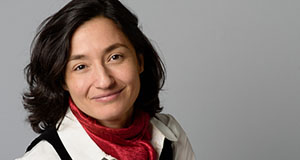Maria Antonietta Loi elected member of the European Academy of Sciences

Maria Antonietta Loi, professor of Photophysics and Optoelectronics at the Zernike Institute for Advanced Materials of the University of Groningen, was elected Fellow of the European Academy of Sciences (EurASc).
EurASc is a fully independent international association of distinguished scholars that aims to recognize and elect to its membership the best European scientists with a vision for Europe as a whole, transcending national borders, and with the aims of strengthening European science and scientific cooperation. Another objective is to take advantage of the expertise of its members in advising other European bodies for the betterment of European research, technological application and social development. It is completely independent from any national entity in its membership, election processes, deliberations and actions. One of EurASc purpose is to play a role complementary to those of national academies and EASAC.
Maria was installed as fellow during a festive ceremony in October 2022 in Brussels. More information and pictures of the ceremony can be found here: https://www.eurasc.eu/eurasc-ceremony-2022-2/
More news
-
29 January 2026
Microplastic research - media hype or real danger?
-
27 January 2026
ERC Proof of Concept grant for Maria Loi
